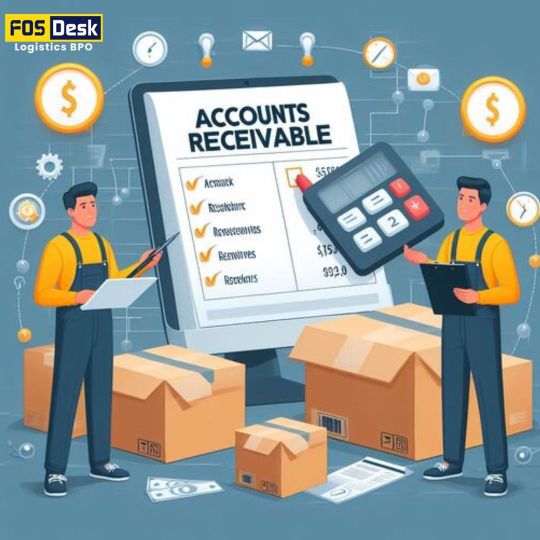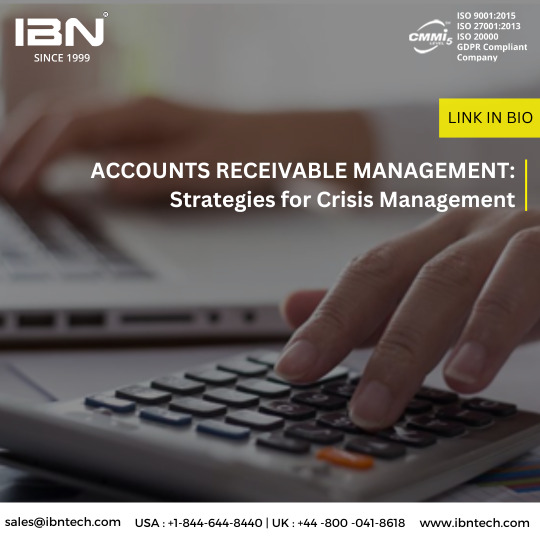#account payable management
Text
The Impact of Digitalization on Traditional Business Processes: A MYND Perspective
Digitalization has emerged as a game-changer for businesses of all sizes and industries in the past few years. With the advent of new technologies, traditional business processes have undergone a significant transformation, paving the way for increased efficiency, improved productivity, and enhanced customer experiences.
#Business Processes#account payable management#compliance management software#hr outsourcing services#payroll management services#payroll software#accounts payable services
0 notes
Text
Accounts payable and Accounts receivable Solutions
Accounts payable and accounts receivable are two important aspects of a business's financial management. Accounts payable refers to the amount of money a business owes to its creditors, such as suppliers or vendors, for goods or services that have been received but not yet paid for. Accounts receivable, on the other hand, refers to the amount of money that a business is entitled to receive from its customers for goods or services that have been sold but not yet paid for. To effectively manage these two areas, businesses can use a variety of solutions such as software or cloud-based systems to automate and streamline the process of recording and tracking transactions, generating invoices, and making payments. Additionally, businesses can use tools such as credit scoring and collections management to manage their receivables and reduce their risk of bad debt. Overall, effectively managing accounts payable and accounts receivable is crucial for maintaining a healthy cash flow and ensuring the financial stability of a business.

3 notes
·
View notes
Text
Accounts Payable Automation Software
Transform your accounts payable process to a truly touchless and compliant process - backed by industry best supplier and Invoice management practices. Learn more for details!
0 notes
Text
Managing Vendor Relationships with Accounts Payable Automation

Vendor management is a cornerstone of your business operations because it ensures that you get the products and services you need to keep your systems moving and customers happy. But sometimes, managing vendor relationships can be easier said than done. Here are some common obstacles that damage interactions with third-party providers and how Accounts Payable Automation can help solidify productive vendor relationships.
The Key to Strong Vendor Relationships: Keeping the Lines of Communication Open
When you keep the lines of communication open, you help eliminate miscommunications that can strain the relationship. It’s best to always provide too much information, as opposed to not quite enough. In many situations, this involves enhancing the visibility between your vendor and your processes. With accounts payable automation, you can quickly surface important information regarding each vendor you do business with, making it easier to communicate key information.
For more information read our blog at https://pathquest.com/knowledge-center/blogs/managing-vendor-relationships-with-accounts-payable-automation/
#vendor relationships#accounts payable automation#financial management solutions#accounting technology trends#risk management in finance
0 notes
Text
In an era where businesses seek efficiency in offshore financial operations, KMK & Associates LLP presents a cutting-edge solution: Coupa. Our offshore accounts payable management service, powered by Coupa's innovative platform, ensures seamless transactions and enhanced control over financial processes. With Coupa's intuitive interface, clients can effortlessly manage invoices, track payments, and mitigate risks associated with offshore transactions. KMK's expert team leverages Coupa's robust features to optimize cash flow, minimize errors, and maximize transparency in accounts payable procedures. Whether it's managing vendor relationships or complying with regulatory requirements, our tailored solutions powered by Coupa provide unmatched efficiency and accuracy. Trust KMK & Associates LLP to revolutionize your offshore accounts payable management, delivering excellence and peace of mind in every transaction. Experience the future of financial management with KMK & Associates LLP and Coupa.
0 notes
Text
6 Important Financial KPIs Every Startup Should Track

Establishing a business is thrilling, but it also presents several difficulties, particularly about money management. As a startup, you're attempting to establish yourself in the market while maintaining financial stability while navigating unknown waters. You must keep a close watch on key financial parameters during your journey as they are your compass to success. Let's examine these indicators in more detail and see why they are so important to the expansion and long-term viability of your firm.
1.Cash Flow Management
Effective cash flow management is critical to any organization, as it is arguably its lifeblood. The timing of these inflows and outflows is just as important as the amount of money coming in and going out. You can meet your financial responsibilities, take advantage of growth possibilities, and overcome unforeseen problems with effective cash flow management. Startups can prevent cash shortages by anticipating them and taking proactive steps to minimize them, such acquiring a line of credit or negotiating extended payment terms with vendors, by regularly monitoring cash flow.
2. Profit and Loss Statement (P&L)
The profit and loss statement (P&L) gives you a quick overview of your business's earnings for a given time frame. By examining this indicator, you can evaluate the profitability of your company and pinpoint areas where expenses can be reduced or sources of income can be increased. You may make well-informed judgments about pricing tactics, resource allocation, and investment objectives by routinely analyzing your P&L statement.
3. Accounts Receivable Aging
Keeping an eye on the aging of accounts receivable is crucial for startups that provide products or services on credit. This measure monitors how long it takes for clients to settle their bills. Extended aging of accounts receivable suggests possible bad debts and liquidity problems. Cash inflows and bad debt write-offs can be reduced by implementing effective invoicing and collection procedures, providing incentives for early payments, and setting explicit credit standards.
4. Accounts Payable Turnover
Conversely, accounts payable turnover gauges how rapidly a business reimburses its vendors and suppliers. Not only may late payments affect your relationship with creditors, but they can also result in late penalties or harm your credit score. Startups can negotiate advantageous payment terms, expedite procurement procedures, and free up funds for important objectives by maximizing accounts payable turnover.
5. Cycle of Cash Conversion (CCC)
The time it takes a business to turn its investments in resources like inventory and other capital into cash flow from sales is measured by the cash conversion cycle. For startups, keeping cash on hand and continuing business requires minimizing the CCC. Startups can reduce their cash cycle duration (CCC) and release cash that has been held in reserve by expediting receivables collection, improving payment terms with suppliers, and automating inventory management.
6. Gross Profit Margin
Following the deduction of the cost of goods sold (COGS), the gross margin indicates the profitability of each unit sold. It's a crucial sign of your company's cost-effectiveness, pricing strategy, and competitive standing. Startups can evaluate the profitability of their products, pinpoint cost centers, and modify pricing or sourcing tactics by keeping an eye on their gross margin. Startups can increase profitability and redirect funds toward expansion projects by optimizing their gross margin.
You must understand the value of sound financial management procedures as you set out on your entrepreneurial path. Keeping an eye on key financial data helps you steer your firm toward sustainable growth, reduce risks, and make well-informed decisions. However handling money may be difficult and time-consuming, particularly for tiny companies with little funding.
This is where outsourced bookkeeping and accounting may make a significant difference. By collaborating with IBN Technologies, a recognized outsourcing company, you can benefit from the experience of seasoned professionals to optimize your financial operations, acquire useful insights, and free up time to focus on key business activities.
#outsourced bookkeeping and accounting#Cycle of Cash Conversion#Accounts Payable Turnover#Cash Flow Management
1 note
·
View note
Text
A Comprehensive Guide to Account Reconciliation for Australian Businesses

From Chaos to Clarity: A Comprehensive Guide to Account Reconciliation for Australian Businesses, with the Assistance of a Business Adviser
Introduction to account reconciliation
As a business owner, ensuring the financial health of your company is paramount. One crucial aspect of maintaining financial stability is account reconciliation. In this comprehensive guide, we will delve into the world of account reconciliation and its significance for Australian businesses. We will explore the challenges faced in the process and how a Business Adviser can assist you in achieving accurate and efficient reconciliation.
Understanding how crucial account reconciliation is to Australian companies
The process of comparing and matching financial transactions from external sources, like bank statements or vendor invoices, with those recorded in a company’s records is known as account reconciliation. By ensuring that the financial data is correct and current, this procedure enables organisations to base their judgements on trustworthy information.
For Australian businesses, account reconciliation is of utmost importance due to various regulatory requirements and tax obligations. To guarantee compliance, the Australian Taxation Office (ATO) carefully examines financial data. Accurate account reconciliation not only helps in meeting these obligations but also provides a clear picture of a company’s financial standing, helping in strategic planning and forecasting.
Challenges faced in account reconciliation
Despite its importance, account reconciliation can be a complex and time-consuming process. Many businesses struggle with challenges such as data discrepancies, missing transactions, and outdated software systems. These challenges often lead to errors in financial reporting and can have serious consequences.
Moreover, the ever-changing regulatory landscape adds another layer of complexity to account reconciliation. Australian businesses must stay updated with the latest regulations and ensure compliance, which can be overwhelming without expert guidance.
The role of a Business Adviser in account reconciliation
Business Advisers play a crucial role in helping Australian businesses navigate the intricacies of account reconciliation. They are financial experts who provide guidance and support in managing various aspects of a company’s finances, including account reconciliation.
Business Advisers possess in-depth knowledge of accounting principles and regulations specific to Australia. They can help businesses streamline their reconciliation process by implementing efficient systems and identifying areas of improvement. Their expertise brings clarity to the reconciliation process and ensures accurate financial reporting.
Benefits of using financial reconciliation services
Engaging financial reconciliation services provided by Business Advisers offers several benefits to Australian businesses. These services go beyond just reconciling accounts and can significantly improve the overall financial management of a company.
Firstly, financial reconciliation services provide a fresh perspective on a company’s financial records. By bringing in an unbiased expert, businesses can gain insights into areas of improvement and identify potential risks.
Additionally, Business Advisers can implement advanced software tools to automate the reconciliation process, reducing the time and effort required. This automation not only enhances accuracy but also frees up valuable resources that can be directed towards core business activities.
Accounts payable reconciliation explained
Among the various types of account reconciliation, accounts payable reconciliation holds particular importance for businesses. It involves matching the invoices received from vendors with the corresponding payments made by the company. This reconciliation ensures that all vendor invoices are accurately recorded and paid on time, avoiding any potential disputes.
Accounts payable reconciliation is crucial for maintaining healthy relationships with suppliers and vendors. When done accurately and promptly, it helps in building trust and credibility, leading to favorable terms and discounts from suppliers. Moreover, it provides a clear picture of a company’s financial liabilities, aiding in budgeting and cash flow management.

#accounting and tax consultancy firm#accounting financial management#accounts payable services company
0 notes
Text
9 Most Outsourced Finance and Accounting Services- Centelli
Consider outsourcing finance and accounting services to focus on core business activities. Popular services include:
Bookkeeping: Accurate recording of financial transactions.
Accounting: Maintaining financial records for statements.
Accounts Receivable: Managing incoming payments.
Accounts Payable: Handling outgoing payments to suppliers.
Invoice Processing: Ensuring accurate and timely invoices.
Payroll Processing: Calculating and disbursing employee salaries.
Tax Preparation: Delegating complex tax processes to experts.
Financial Analysis: Evaluating business performance for improvement.
Accounting Automation: Utilizing automation for efficient processes.
Tips for outsourcing:
Assess the role of each financial function in your business.
Choose a qualified and trustworthy outsourcing provider.
Consider outsourcing specific processes based on budget constraints.
Outsourcing can unbind internal resources for strategic use and enhance competitiveness. Whether a startup, SMB, or large corporation, explore the benefits of finance and accounting outsourcing.
#accounting#finance#bookkeeping#outsourcing#Bookkeeping Services#Accounting Services#Account Payable#Account Receivable#Financial Analysis#Business Management#Technology#RPA#Small Business#Accounting Automation#Sage Accounting
0 notes
Text
Accounts Receivable in Logistics

Accounts receivable in logistics refers to the outstanding payments owed to a company for services rendered. In the logistics industry, this includes charges for shipping, transportation, and related services. Efficient management of accounts receivable is crucial for maintaining cash flow and ensuring timely payments, contributing to the financial health and stability of logistics operations.
Note: Explore actionable strategies in our article "How To Improve Your Logistics Efficiency In Accounts Receivable?" to enhance your financial operations and ensure timely payments.
#logistics#logistics bpo services#transportation#import#export#freight forwarding#Accounts receivable#accounts payable#suply chain management
0 notes
Text
Retirement Village Software: Streamline Your Operations and Improve Resident Care
Retirement village software is a comprehensive software solution that can help you streamline your operations and improve resident care. It can automate many of the tasks involved in running a retirement village software, such as:
Managing resident records
Tracking occupancy and waitlists
Scheduling staff and activities
Managing finances and billing
Generating reports
Communicating with residents and families
This can free up your staff to focus on providing the best possible care to your residents.
In addition, retirement village software can help you improve resident care by providing you with the tools you need to:
Track resident health and care needs
Develop personalized care plans
Coordinate care with other providers
Monitor resident satisfaction
This can help you ensure that your residents are receiving the care they need and that they are happy with the quality of life in your retirement village.
If you are looking for a way to streamline your operations and improve resident care, consider investing in retirement village software.

#accounts payable software australia#aged care accounting#accounts receivable brisbane#asset management software australia#accounts payable brisbane
0 notes
Text
Overcoming Growth Barriers in AP Automation: A Roadmap for Success
In the ever-evolving landscape of financial processes, overcoming growth barriers in Accounts Payable (AP) automation is paramount for sustained success. At Mynd Integrated Solution, we understand the intricacies of AP automation and have crafted a comprehensive roadmap to guide you through the challenges and propel your organization towards unparalleled efficiency and growth.
0 notes
Text
How automation in AP works and how it can improve your accounting process

Accounts Payable is one of the most vital processes across industries. The amount of time organizations take to manage the workflow due to multiple data points, sources of information, multiple invoice formats, and touchpoints can be massive. Automating the entire process can help streamline the process by leveraging business intelligence. Further, it reduces the time for receiving, processing and paying invoices by identifying the critical information and eliminating manual tasks.
An average business has 24% of its monthly revenue held up in terms of trade credit in the US. Consequently, it offers a huge opportunity to utilize smarter processing solutions to keep accounts payable updated. Automating the AP processes with an IDP solution can be beneficial here.
This article will give an overview of how automation in AP works and how it can improve your accounting process. So without waiting further, let’s delve into it.
Accounts Payable cycle – The lifeline of business operations
In simple terms, Accounts Payable are the records of financial transactions that contain detailed information regarding a company’s purchases. This department deals with orders, invoices, and other checks regularly to record the financial liabilities of a company.
Usually, a standard AP process has some basic workflow — identifying all the vendors and determining their payment terms aligning with the purchase orders. After fulfilling the purchase orders and receipt of invoices, the accounts department then makes the payments according to the agreed timeline. However, the entire process is often manual, making it prone to errors. Further, it may need more critical information and consistency in document formats or sources, making the process inadequate for auditing.
Automating your AP process might be the key to all these issues. It offers better management of invoices, purchase orders, and other financial documents and makes the entire process smoother.
Why do Finance and Accounts need intelligent automation?
The digital-first ecosystem has made several redundant tasks easier for executives. A business can have data on purchase orders, payment records, accounts payable reconciliations, and vendor information readily available on its system. However, managing the invoices received, usually in unstructured formats, might be a challenge to become efficient. Automating the process can seamlessly increase efficiency, reduce errors, and allow an audit trail with a few clicks. Further, it helps in having holistic insights into the company’s financial transactions without requiring additional manual efforts.
An automated accounts payable is set up by identifying the vendors and tracking accounts that have regular transactions with the company. Next, it needs to index and extract the relevant information from the documents and manage the payments. Companies having a manual system can find the effort tedious and prone to human errors due to multiple stakeholders, layers or permissions, and chances of incorrect inputs. Automating the process makes all of these almost nonexistent and improves the process’s efficiency and accuracy.
How intelligent automation in Accounts Payable works
An automated AP processing solutions uses AI and ML as the core of its system. It leverages several technologies, such as OCR, computer vision, and intelligent document processing, to cut down redundant and manual tasks to make the process seamless.
These technologies can help detect information from multiple documents, digitize them, and extract relevant information according to the companies’ requirements or the preset business rules. Further, it can capture the required data from templateless formats and present it in a coherent way, allowing automation of the entire process without requiring human intervention.
DocVu.AI, a leading enterprise-grade intelligent document processing, helps you simplify your accounts payable process in a few steps. These are:
Pre-processing of documents – Selection and classification of documents according to multiple attributes.
Data extraction – Extraction of relevant information into electronic form according to the data fields and importing them into the processing system using automation to reduce human errors.
Data validation and Quality Checks – Reviewing and rechecking the extracted data for accuracy and validating them for recapturing missing data fields or further processing.
Ideal AP automation system requirements
Automating your accounts payable system helps businesses manage the entire process without any human intervention, resulting in more accurate and efficient settlements of accounts. It considers multiple document formats across vendors and leverages an intelligent machine-learning model to understand the data points better to extract relevant information. Further, it makes the entire process extremely fast as multiple to and fro between stakeholders becomes less and requires no manual cross-checks for errors.
DocVu.AI helps companies leverage their document processing system to become flexible and scale their invoice processing as needed. It offers straight-through processing of accounts payable with customized business rules engines to offer bulk processing of documents with greater efficiency.
In Conclusion
In a world that is fast adopting tech-based solutions, it is prudent to explore certain advancements and realign business processes according to your requirements. Realizing the need for automation in processing your accounts payable can be one such necessary transformation. Automating AP using an IDP solution helps you save time, improve efficiency, and offer more accurate processing without multiple approvals due to the embedded machine learning models.
If you are looking to consider IDP implementation to streamline your accounts payable process. Contact us today to learn more and schedule a demo. https://www.docvu.ai/industry/finance-accounting/
#automation#intelligent document processing#document processing#mortgage processing#idp#mortgage#accounts payable#accounts receivable management services
0 notes
Text
Streamline AP Process: A Guide to Effective Accounts Payable Document Management

Are you also continuously stressed about arranging paper-based documents? The ones that arrive at a snail’s pace? It is indeed a tedious task. Handling accounts payable (AP)—such as recording, approving, and settling a company’s bills and payments—can indeed pose quite a challenge. Invoices come at different intervals, through various channels, and from different sources.
Some come through traditional mail, while others are attached to emails forwarded to different managers across the company. As the company expands, this issue only worsens.
As the volume of invoices, purchase orders, and approvals increase, AP teams require a structured approach to managing documents. Fear not! In this blog, we’ll discuss tips and effective ways to streamline your accounts payable process and maintain order among those documents.
For More Information visit us at https://pathquest.com/knowledge-center/blogs/streamline-ap-process-a-guide-to-effective-accounts-payable-document-management/
0 notes
Text
At KMK & Associates LLP, we excel in optimizing offshore accounts payable management through our profound SAP expertise. Leveraging cutting-edge technologies and industry best practices, we streamline your accounts payable processes, ensuring accuracy, efficiency, and compliance. Our team possesses deep knowledge of SAP systems, enabling us to customize solutions tailored to your specific needs and challenges. From invoice processing to vendor management, we provide end-to-end support to enhance transparency and control over your offshore accounts payable functions. With our meticulous approach and commitment to excellence, we empower your organization to minimize risks, reduce costs, and maximize operational efficiency in managing offshore accounts payable. Partner with KMK & Associates LLP to unlock the full potential of your SAP platform and transform your offshore accounts payable operations.
1 note
·
View note
Text

Generally, AR refers to the money that the company is owed by its clients or, alternatively, to unpaid bills. The AR simply represents all the unpaid business invoices that you have yet to collect.
Read More: - Accounts Receivable Managements
#accounts receivable#bookkeeping services for small business#accounts payable outsourcing#accounts receivable process#accounts receivable outsourcing#accounts receivable management
0 notes
Text
Navigate account reconciliation for Australian businesses with our comprehensive guide, enriched by insights from expert business advisers. Learn more here!
0 notes